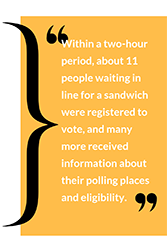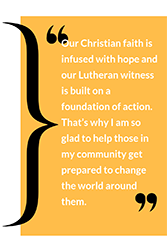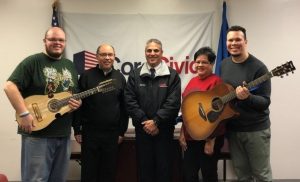Synopsis from a sermon preached by the Rev. Dr. Yolanda Denson-Byers at the historic “Lift Every Voice” African Descent Lutheran Association (ADLA) & Extraordinary Lutheran Ministries (ELM) Worship Service on Friday, August 2, 2019 in Milwaukee, Wisconsin.
Sermon Based on: Acts 10
I come before you with a pastor’s heart to address the hurt, pain, and suffering that I am aware is present in this room. As a human being who identifies as female, Black, and queer, I recognize that as African descent Lutherans, allies, and queer folks we make an unlikely assembly.
I’m sure it’s no secret that our communities have not always seen eye to eye on many different issues. The African descent community has often lamented that those in the queer community have not been more faithful allies in the struggle against racism and queer folks have lamented that Black folks have not been more faithful collaborators in the struggle against homophobia.
In the Acts reading from today, an unlikely assembly was also gathered together by God. It appears that God was up to some holy mischief. Isn’t it exciting when God brings together two communities previously at odds with one another?
As a cradle born African American Christian, one of the things I have appreciated most about the Black Church is the enduring quest for freedom, equality, and justice for Africans in the United States of America. We were kidnapped from Africa, enslaved in the U.S., suffered through Jim Crow segregation, and now daily reiterate in words and deeds that #BlackLivesMatter. As an out, and gay, person in America, I now recognize that the queer struggle for equality has also been fraught with discrimination, hardship, violence, and death.
Ironically, for both of our communities, one of the greatest challenges to our righteous struggle has been the Christian Church which has long had ideas about who is clean and unclean, saved and unsaved, worthy of salvation and worthy of damnation.
Simon Peter showed how this bias works, when he arrived at Cornelius’ house, stating boldly, “You yourselves know that it is unlawful for a Jew to associate with or visit a Gentile.” Did you hear, Peter? He essentially said, “It’s in the Word.”
Now, I hope that all of us in this room know that we need to be extremely careful when we weaponize scripture to oppress any of God’s Kids. We know that it was these kinds of interpretation of scripture, without regard to contextualization, culture, or even a basic respect for The Law of Love, that has made all sorts of atrocities possible.
That is why we need our friends and allies in the Christian Church to join us in the mission and ministry of bringing Jesus’ good news to those who have not historically received such a gracious message. So today, I ask our friends and allies, “What is the good news that you can deliver to the unarmed sons and daughters of African Americans being killed by racist police officers in your neighborhoods? What is your good news message to children who still don’t have clean water in Flint? What is your good news message to gay kids thinking of commiting suicide, the queer professional fired from his job, or to the survivors of The Pulse nightclub in Florida? What is your good news message to African Americans, the Rainbow Nation, and to all of those who are hurting, oppressed, and marginalized in your own neighborhoods?”
Dear Ones, our unity is our strength. Thank God, that our mischief making God brought Jewish-Christ followers and Gentiles together in Caesarea. Thank God, She brought ADLA and ELM together in Milwaukee, and thank God that she will continue to call together unlikely assemblies in every time, and in every place, to affirm the full inclusion of all humanity at the Banquet Feast of our God.
That is why Peter could declare, “Truly, I understand that God shows no partiality, but in every nation anyone who fears God and does what is right is acceptable to God … Jesus commanded us to preach to the people and to testify that he is the one ordained by God as judge of the living and the dead. All the prophets testify about him that everyone who believes in him receives forgiveness of sins through his name.”
I don’t know about you, but I am so glad that Jesus lived, died, and rose again! I am so glad that the Holy Spirit is continually putting a new leaf in the table and pulling up an additional chair! I am so glad that God declares again and again, all are welcome, all are welcome, all are welcome in this place! Amen.
Note: You can view this sermon in its entirety at https://youtu.be/bbHCVgqgy5o
To learn more about Extraordinary Lutheran Ministries visit: www.elm.org
To learn more about the African Descent Lutheran Association visit: www.adlaelca.org
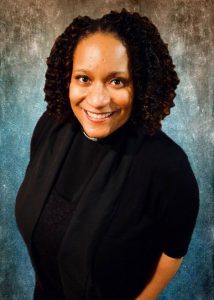
The Rev. Dr. Yolanda Denson-Byers hails from Saint Louis, Missouri. She earned a Bachelor of Arts degree from Wesleyan University in Religion and African-American Studies. Her Masters of Divinity is from Harvard University with specialty in worship, preaching, education, and pastoral care and counseling. Her Doctorate of Ministry is in the field of Congregational Mission and Leadership from Luther Seminary in St. Paul, Minnesota.
Pastor Yolanda is a missional leader , with a heart for social justice issues, who has, for the last twenty-three years, been exercising her gifts through the vocations of pastor, evangelist, campus minister, hospice chaplain, and bereavement counselor. In addition, she is very proud of her ministry as a wife and mother. Pastor Yolanda enjoys reading, writing, camping, and anything pertaining to a warm climate with a salt water beach!
 “More people” turned out to be over double the voters on Nov. 6, 2018 than in the previous year. In Lorain County, Ohio, 26.80%* of those eligible voted in November 2017—in November 2018, we hit 54.15%.** This is a trend I am hopeful we will continue to see.
“More people” turned out to be over double the voters on Nov. 6, 2018 than in the previous year. In Lorain County, Ohio, 26.80%* of those eligible voted in November 2017—in November 2018, we hit 54.15%.** This is a trend I am hopeful we will continue to see.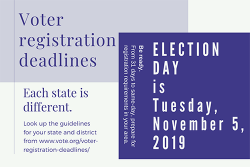 I am a firm believer that everyone eligible should vote in this country, but why should faith communities be involved? For me, our faith equals love. In Mark 12:30-31, Jesus commands us to love the Lord your God with all your heart and with all your soul and with all your mind and with all your strength, and to love your neighbor as yourself. “There is no commandment greater than these,” Jesus teaches. To love God means to love all, every one of us.
I am a firm believer that everyone eligible should vote in this country, but why should faith communities be involved? For me, our faith equals love. In Mark 12:30-31, Jesus commands us to love the Lord your God with all your heart and with all your soul and with all your mind and with all your strength, and to love your neighbor as yourself. “There is no commandment greater than these,” Jesus teaches. To love God means to love all, every one of us.


